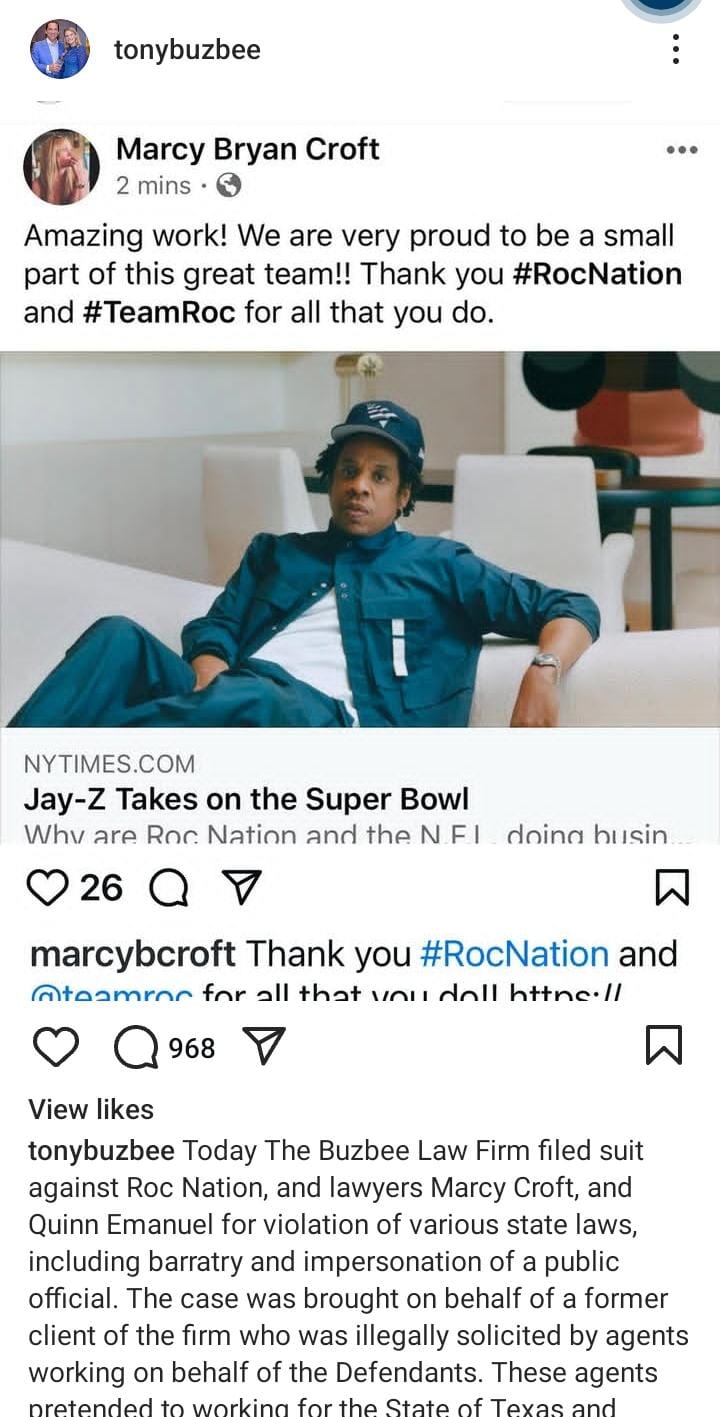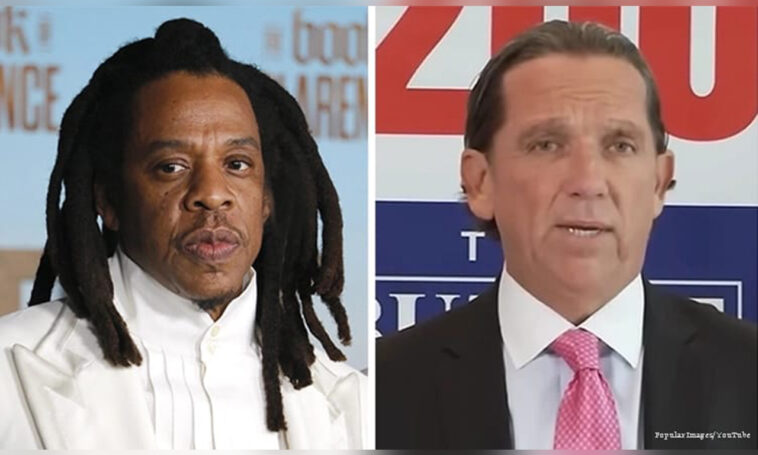Renowned attorney Tony Buzbee has taken legal action against Roc Nation, alleging that the entertainment giant and its associates engaged in illegal client solicitation and enticed his former clients to make baseless claims against him. This legal feud raises significant questions about ethical practices within the legal and entertainment industries, shedding light on potential conflicts of interest and aggressive competition for high-profile cases.
Tony Buzbee, known for his high-profile legal battles and reputation as a formidable litigator, filed a lawsuit asserting that Roc Nation, founded by music mogul Jay-Z, had engaged in improper and unethical practices to undermine his legal practice.
According to Buzbee, Roc Nation and its affiliates targeted his former clients, urging them to sever ties with him and file “frivolous” lawsuits or complaints.
These allegations point to a deeper contention over client retention, legal ethics, and corporate strategies in handling disputes.Roc Nation, which operates as an entertainment company with ventures spanning music, sports, and other industries, also manages legal disputes for its clientele. This dual role sometimes places the organization at the intersection of legal battles and high-stakes negotiations, making the accusations against them particularly noteworthy.At the core of Buzbee’s lawsuit are claims that Roc Nation violated legal and ethical standards by engaging in illegal client solicitation.
Buzbee alleges that Roc Nation’s representatives reached out to his clients with promises of better representation or outcomes, thereby persuading them to terminate their agreements with him. Such actions, if proven, would contravene rules governing attorney-client relationships and solicitation practices.

Buzbee also accuses Roc Nation of orchestrating a campaign to defame him. He asserts that his former clients were encouraged to lodge unsubstantiated claims about his professional conduct, aiming to damage his reputation and weaken his legal standing. This alleged defamation campaign, Buzbee contends, was not only malicious but also designed to disrupt his law practice.
The accusations highlight the fine line between aggressive client acquisition strategies and unethical conduct in the legal industry. Client solicitation is a sensitive issue governed by strict rules in most jurisdictions. Attorneys and firms are prohibited from engaging in direct solicitation that might exploit vulnerable clients or manipulate them into switching legal representation.
If Roc Nation is found to have violated these rules, it could face severe penalties, including fines, reputational damage, and legal action from regulatory bodies. Similarly, the alleged defamation campaign raises concerns about the role of corporate entities in influencing legal disputes. Any proven coordination of false claims against an attorney would constitute a serious breach of ethical standards, potentially resulting in lawsuits for damages.
This case is not merely about one attorney’s grievances but also reflects broader trends in the intersection of law, entertainment, and corporate power. Roc Nation’s involvement in legal disputes for its clients suggests that entertainment companies are increasingly adopting a hands-on approach to legal matters. This approach, while potentially beneficial for clients, raises questions about conflicts of interest and the methods employed to secure favorable outcomes.
The entertainment industry is no stranger to disputes over client retention and representation. High-profile clients often attract multiple firms or entities vying for control over lucrative cases. In such competitive environments, accusations of unethical behavior are not uncommon. Buzbee’s lawsuit underscores the need for clear boundaries and adherence to professional standards to maintain trust and integrity in legal representation.
As of now, Roc Nation has not publicly commented on the lawsuit. However, the company is expected to mount a robust defense, challenging Buzbee’s claims and potentially presenting evidence to refute the allegations. The outcome of this legal battle will depend on the strength of the evidence presented by both sides, as well as the interpretation of relevant laws governing client solicitation and defamation.
The case serves as a cautionary tale for attorneys and corporate entities alike, emphasizing the importance of ethical practices in client relationships. It also highlights the challenges faced by high-profile attorneys like Buzbee, who often operate in competitive and contentious environments.
For the entertainment industry, the lawsuit may prompt a reevaluation of how companies like Roc Nation handle legal disputes and interact with clients. Transparency and adherence to ethical standards will be crucial in avoiding similar allegations in the future.
Tony Buzbee’s lawsuit against Roc Nation brings to light significant issues surrounding client solicitation, ethical practices, and the interplay between law and corporate influence. As the case unfolds, it will undoubtedly attract widespread attention, serving as a critical moment for both the legal and entertainment industries. Whether Buzbee can substantiate his claims or Roc Nation successfully defends itself, the outcome will likely have far-reaching implications, shaping how legal and corporate entities operate in high-stakes environments.




Join the Community and Be a Part of the Conversation
You must be logged in or registered to post a comment.